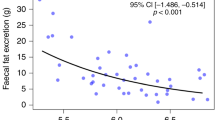Summary.
Background: Exocrine pancreatic insufficiency is a major clinical manifestation of cystic fibrosis (CF). Almost nine of ten patients develop signs and symptoms of maldigestion and malabsorption, which often deteriorates nutritional status and therefore worsens the prognosis. Human faecal elastase-1 (FE-1) has shown promising results to assess exocrine pancreatic insufficiency, and this test has been used at Haukeland University Hospital since 1996. Aim of the study: To evaluate FE-1 values and fat-soluble vitamin profiles in patients with CF and to correlate exocrine pancreatic function as measured as FE-1 to fat-soluble vitamin profiles. Moreover, we wanted to assess if there are differences between fat-soluble vitamin profiles in patients with impaired versus patent exocrine pancreatic function, and thirdly, if fat-soluble vitamin deficiency at diagnosis is effectively treated by supplementation. Methods: Consecutive analyses (N = 212) of fat-soluble vitamin profiles and 35 analyses of FE-1 were investigated in 35 patients with CF. In 17 out of 35 patients fat-soluble vitamin profiles were also assessed at diagnosis. Results Mean value of FE-1 for all CF patients was 256.9 μg/g faeces (median 24.1 μg/g faeces). CF patients considered to have maldigestion (N=24) showed a mean value of 19.9 μg/g faeces (median 18.7 μg/g faeces), those without pancreas affection had a mean value of 773.9 μg/g faeces (median 728.9 μg/g faeces, p < 0.01). There was no difference in fat-soluble vitamin profiles among patients with or without exocrine pancreatic insufficiency while on appropriate supplementation. Median value for vitamin E in patients with exocrine pancreatic insufficiency at diagnosis was low (3.6 mg/L). Supplementation of pancreatic enzymes and vitamins normalised profiles in this group at follow-up. There was no significant correlation between exocrine pancreatic function as measured as FE-1 and fat-soluble vitamin profiles, neither in patients with impaired nor in those with patent pancreatic function. Conclusions: Severe degree of exocrine pancreatic insufficiency is common in patients with cystic fibrosis. There was no correlation of faecal elastase-1 levels to fat-soluble vitamin status. Fat-soluble vitamins (A, D, E) given in appropriate dosages combined with pancreatic enzymes ensured normal profiles in our patients with CF and malabsorption. Officially recommended supplementation of vitamin A and D in Norway during infancy and childhood may explain why so few patients had vitamin deficiencies at diagnosis.
Similar content being viewed by others
Author information
Authors and Affiliations
Additional information
Received: 20 March 2002, Accepted: 11 June 2002
Rights and permissions
About this article
Cite this article
Dorlöchter, L., Aksnes, L. & Fluge, G. Faecal elastase-1 and fat-soluble vitamin profiles in patients with cystic fibrosis in Western Norway. Eur J Nutr 41, 148–152 (2002). https://doi.org/10.1007/s00394-002-0369-z
Published:
Issue Date:
DOI: https://doi.org/10.1007/s00394-002-0369-z



